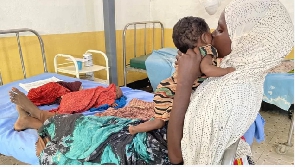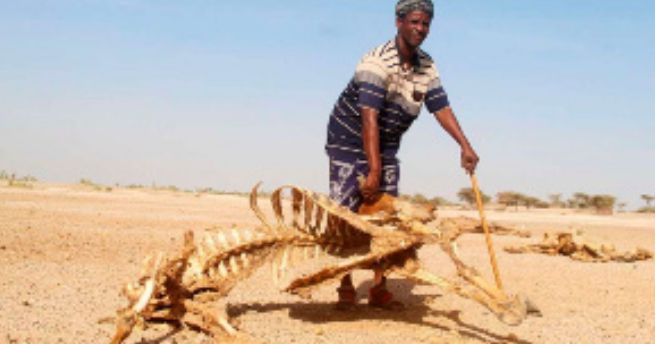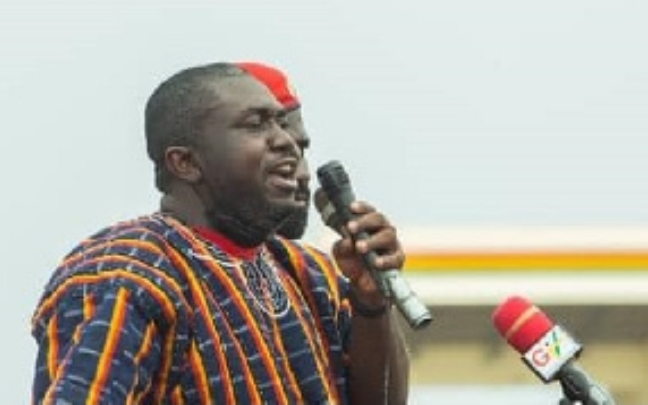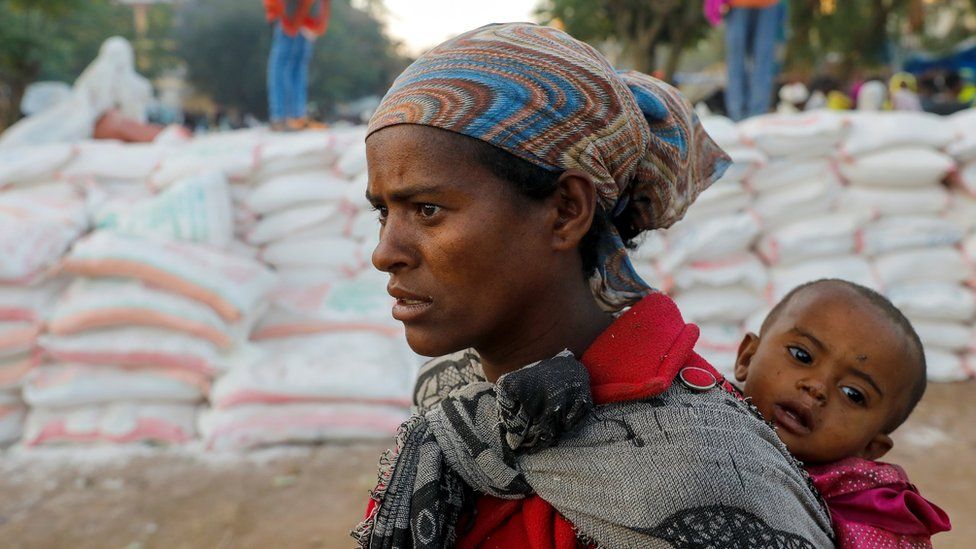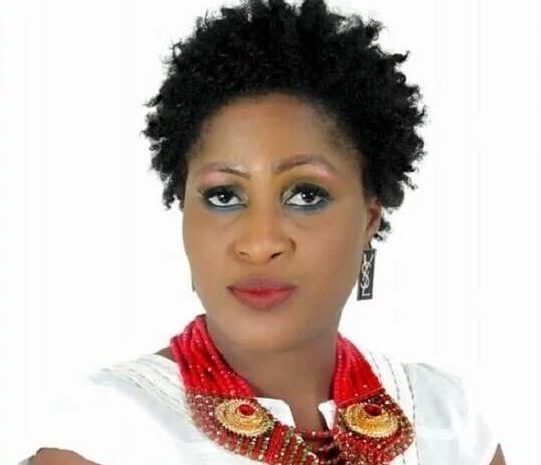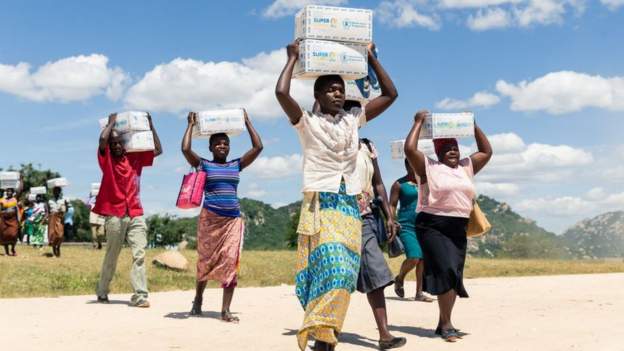News Africa
Witnessing how two-year-old pikin die from hunger
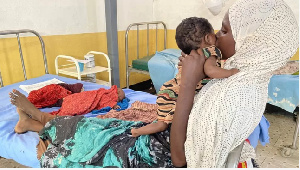
Afta two days for one small Somali hospital, e be like say Abdiwali Abdi bin dey recover.
Di two-year-old still weigh just 4.6kg (10lb 2oz) – weight wey no really pass dat of a newborn. But im get di energy to moan now, and im mama, Hawa, siddon beside am on di bed, for di border town of Dollow, dey breastfeed her two-month-old daughter and dey make hopeful plans to return to dia makeshift camp on di dusty outskirts.
“E dey encouraging,” Fatuma Mohammed, one senior nurse and administrator from Kenya tok, as she dey waka around di 17-bed stabilisation ward, wit 17 infants dey battle wit malnutrition, and wit di different diseases wey follow am on di dry, thorny plains of southern Somalia, as di kontri dey battle wit di worst drought in 40 years.
“We no get food to feed am, but our neighbours don dey help us,” Hawa, 22, tok as she dey watch her son closely. Im don dey grow weaker for weeks, wit fever and diarrhoea, before dem finally come seek help.
Di district hospital for Dollow – one dusty little border town for south-western Somalia – don dey quietly assist children like Abdiwali for years. Funded by di UK government, and others, e don build up a network of community workers wey dey provide basic medical support, no be just in town, but deep into di contested countryside, wia di militant Islamist group al-Shabab dey control many villages.
But today, afta one fifth failed rainy season, Dollow dey overwhelmed as many new arrivals dey come. Tens of thousands of families like Abdiwali – dia cattle dead and dia farms parched – don gada for crowded informal settlements, hope to find food and safety.
We dey tok about hundreds of thousands of lives [at stake] and pipo dey die now. We no get enough resources to support dem,” Abdulkadir Mohamed, from di Norwegian Refugee Council tok as e dey watch more families dey arrive for one of di larger camps.
For di hospital, nearly 100 women siddon for di midday heat, nursing malnourished infants, waiting make dem weigh and assess dem.
“E go dey really bad hia. We dey expecting things to get worse – we dey expect one formal declaration [of famine] very soon,” Pamela Wasonga, wey dey run di hospital nutrition programme on behalf of one Irish charity, Trocaire.
Di United Nations dey warn say 6.7 million pipo go need food aid for Somalia for di coming months – about 40% of di population.
Overnight, Abdiwali condition later get worse more and more. Soon afta nine di next morning, im temperature fall sharply, and two Somali doctors quickly wrap am wit one thermal blanket made of foil. Two beds away, one 18-month-old girl bin dey get di same, urgent treatment.
“We dey really worried. Dis children no fit control dia temperatures very well. Na why we never put on di [ceiling] fans for di stabilisation centres. If di child warm up, then di survival rate dey higher,” Ms Mohammed tok, as one doctor rest a thermometer under Abdiwali limp arm.
By now, di boy papa, Kerad Adan, 28, don arrive for di hospital, and im dey pace nervously around di bed.
Before dis new drought, di family bin dey okay, wit four children, 40 cows and a thatched home near di town of Qansax Dheere, 200km (125 miles) south of Dollow.
But dat region, Bay, lies at di centre of di current drought, and, two months ago, di last of di family cattle – di source of all dia wealth – die. Soon afta dat, di parents decide to pack up a few belongings on one donkey cart and head north with the family, trekking for six days. Al-Shabab militants try to stop dem leaving di town but settle to spoil Oga Adan mobile phone, smash am for im front.
Suddenly di doctors cluster around Abdiwali. One of dem use two fingers to press, repeatedly, on im chest, hope to stimulate one heartbeat. Im colleague move closer to look into di child unmoving eyes. Di parents stand quietly for di foot of di bed.
And then, around 10:13 for one overcast morning, E don over.
“Di heartbeats don go,” Ms Mohammed whisper, as im watch Abdiwali mama as she slump onto di bed and begin to cry.
“We don dey able to rescue plenti babies. But probably things dey get worse now,” Ms Mohammed tok like pesin wey don seen dis kain scene many times.
“E dey so sad and painful wen you witness something wey dem fit prevent and correct very easily,” di hospital head doctor, Ali Shueb tok.
Within minutes, Abdiwali papa dey on di phone, dey alert relatives, and plan one funeral, dat afternoon.
“Everyone must die, at some time,” im tok, quietly, as if to imself.
One ambulance reverse up di narrow lane outside di hospital, and Abdiwali parents climb onboard, di papa carefully hold im son body, wrap inside one heavy piece of material, in both hands.
Later, Pamela Wasonga show visitors di hospital pharmacy wey dey well-stocked and small laboratory. She first enta Somalia from her home for Kenya during im last famine, for 2011, and don dey here ever since, confident say much don change since then, and say di steady work of di past decade dey pay off.
“I think di continuity of service wey don dey here all along don probably avert one very, very much worse situation. E get more [international] organisations now on di ground, and more local organisations wey fit reach remote and hard to reach areas,” she tok.
And yet, just as another famine dey loom, di hospital don – perhaps temporarily – lose half of im international funding as a result of delay wey political gbas gbos dey cause for di capital, Mogadishu.
Worse still na growing evidence say a distracted world don dey slow to recognise di scale of di catastrophe wey now don unfold for Somalia, wit new data dey show say less than half di humanitarian funding required to respond to di drought na im dey currently in place.
Di UK, for instance, provide ova £200 million ($223 million) in humanitarian assistance during Somalia last serious drought for 2017. Dis year e dey spend less than a quarter of dat.
“We ask di world… not to lose focus on Somalia. Somalia need help now. If we don’t get it, we dey head for a catastrophe, for sure,” Ms Wasonga tok.
By di time di ambulance reach di far edge of Ladan camp, on di eastern outskirts of town, one crowd don gada outside di family tent.
Flurries of wind whip up spirals of thick dust. Dem bring Jerry cans of water to wash di child body. Someone bin don already bring one special piece of white linen for di burial. Then two neighbours, shovels slung ova bony shoulders, set off towards one fenced-off scrap of wasteland to dig a grave. Dem choose one spot between two oda small, child-sized piles of earth.
One hour later, Hawa arrive for di cemetery. By tradition, women no dey attend burials. But she and her mama don make am clear say dem no go keep dem away, and so dem siddon wit a few oda women, perhaps 20 metres from di graveside.
“You try your best.” “You get oda children.” Di women quietly pass around words of sympathy and encouragement, as Abdiwali papa take turns wit di oda men, dey swing one pickaxe into di hard, dry earth.
CLICK HERE TO DOWNLOAD PRESS RADIO MOBILE APP
One short prayer follow, then di burial itself. Then Abdiwali parents walk back towards dia new home, as di wind blow in across di plain, and scraps of rags and litter shook on one thousand, bone-dry, thorn bushes.
Source: www.bbc.com
-
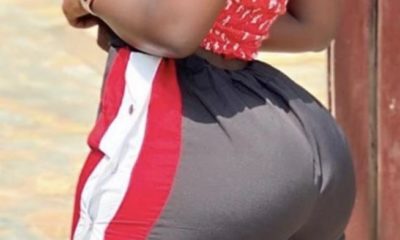
 Lifestyle1 month ago
Lifestyle1 month agoRoad Safety Authority narrates how buttocks causes road accident
-

 GENERAL NEWS1 month ago
GENERAL NEWS1 month agoWhy 15 police officers stormed Owusu Bempah’s church – Kumchacha narrates
-
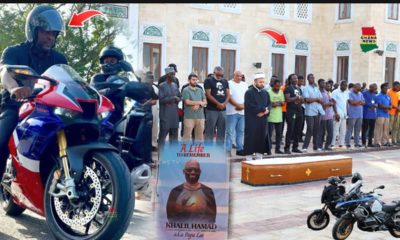
 GENERAL NEWS1 month ago
GENERAL NEWS1 month agoWatch how Ibrahim Mahama rode Honda superbike to pay last respects to late friend
-

 GENERAL NEWS1 month ago
GENERAL NEWS1 month agoHow Offinso residents storm destooled queen mother’s house, demand for new chief
-

 South Africa News1 month ago
South Africa News1 month agoWoman thrown out of a speeding taxi while on her way to work
-

 GENERAL NEWS2 weeks ago
GENERAL NEWS2 weeks agoDeadly clash between youth and navy personnel results in two deaths at Tema Manhean
-

 SHOWBIZ KONKONSAH3 weeks ago
SHOWBIZ KONKONSAH3 weeks agoJunior Pope’s Death: Video of John Dumelo refusing to join canoe for movie shoot over safety concerns resurfaces
-

 News Africa2 months ago
News Africa2 months ago‘Satanically dubious’ – SCOAN releases statement on BBC’s report about TB Joshua, church

